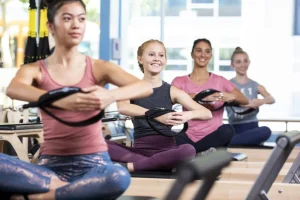Tai Chi moves are slow and controlled, which makes them gentle on joints and muscles. Furthermore, due to being low impact and safe for people of any age or fitness level to practice.
Many tai chi instructors come from medical backgrounds, such as physical therapists or doctors of acupuncture. Such instructors may be better able to understand and modify movements for people living with chronic health conditions like arthritis.
Increased Flexibility
Tai Chi is a gentle yet low-impact exercise that works various muscle groups in your abdomen and back without pausing between each posture, with particular attention given to circular movements of these areas. Tai Chi can improve flexibility by helping ground yourself more securely while helping prevent slouching which places unnecessary strain on the spine.
Recent meta-analyses demonstrated the significant benefits of Tai Chi on muscle strength, physical endurance, functional capacity, postural balance and thoracolumbar spine flexibility. The study authors acknowledged some between-study heterogeneity due to different durations of Tai Chi training as well as testing methods used (eg questionnaires or clinical assessments like Timed Up and Go test), recall of adverse events by participants which has an inherent high risk of bias.
Tai Chi can be enjoyed by people of all ages and fitness levels, even those living with chronic health conditions. Its gentle movements and mindfulness-based practice make it an ideal way for older adults to increase balance flexibility and stay active.
Strengthened Muscles
Tai Chi is an exercise form which engages multiple muscle groups through flowing movements. Studies have demonstrated its efficacy at increasing hand grip strength, physical endurance, postural balance and thoracolumbar spine flexibility for both healthy adults and those living with chronic diseases.
Tai Chi is an effective, low-impact exercise that won’t put stress on joints or increase pain or shortness of breath, while teaching balance awareness – early lessons show participants how to plant both feet on the ground without shifting weight from side to side; an excellent practice both for improving balance itself as well as preventing falls.
Tai Chi can easily accommodate people of varying ability levels and health concerns. Consult with your healthcare provider before beginning any new exercise regime, including Tai Chi; but this gentle form is usually considered safe for most. Plus it’s fun! OSU Extension family and consumer sciences professionals offer free Tai Chi classes for people of all ages.
Reduced Stress
Tai Chi’s slow, fluid movements promote coordination and physical balance while its integration of movement with breathing promotes relaxation – acting as a natural stress reliever.
Research indicates that Tai Chi reduces anxiety and depression. Furthermore, it improves flexibility by stretching muscles more freely while strengthening them more tightly; all while helping reduce risk of falls among older adults. Studies indicate Tai Chi improves proprioception – an ability to sense where one’s body is in space which declines with age – which may reduce fear of falling and potentially increase chances of falling more often.
To reap its full benefits, regular practice of Tai Chi is key. Try practicing a little each day or several times each week; being consistent will speed up your results faster. Beginners may want to start off slowly, practicing for one hour twice weekly at first before expanding on this.
Improved Sleep
Tai Chi can improve sleep quality for healthy individuals as well as those living with chronic health conditions, according to studies. Focusing on breathing deeply, moving slowly and mindfully and having a calm mindset are all hallmarks of effective Tai Chi practice. Studies have confirmed this effect.
Studies comparing participants who practice Tai Chi to those engaging in low-impact exercises revealed that those engaged in Tai Chi experienced higher PSQI scores compared with their low-impact exercise counterparts, as well as lower Hamilton depression scale scores and self-rating anxiety scale scores.
Researchers believe Tai Chi can significantly improve sleep quality because it increases blood flow to the brain and promotes relaxation, as well as stimulating certain chemical releases within it that promote positive emotions. Furthermore, its slow movements stimulate muscles that enhance postural stability – an especially valuable benefit for people at risk of falling or with difficulty walking.





